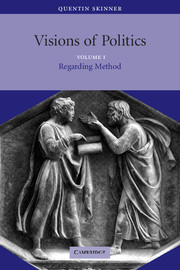Book contents
- Frontmatter
- Contents
- General preface
- Full Contents: Volumes 1–3
- Acknowledgements
- Conventions
- 1 Introduction : Seeing things their way
- 2 The practice of history and the cult of the fact
- 3 Interpretation, rationality and truth
- 4 Meaning and understanding in the history of ideas
- 5 Motives, intentions and interpretation
- 6 Interpretation and the understanding of speech acts
- 7 ‘Social meaning’ and the explanation of social action
- 8 Moral principles and social change
- 9 The idea of a cultural lexicon
- 10 Retrospect : Studying rhetoric and conceptual change
- Bibliography
- Index
7 - ‘Social meaning’ and the explanation of social action
Published online by Cambridge University Press: 05 September 2012
- Frontmatter
- Contents
- General preface
- Full Contents: Volumes 1–3
- Acknowledgements
- Conventions
- 1 Introduction : Seeing things their way
- 2 The practice of history and the cult of the fact
- 3 Interpretation, rationality and truth
- 4 Meaning and understanding in the history of ideas
- 5 Motives, intentions and interpretation
- 6 Interpretation and the understanding of speech acts
- 7 ‘Social meaning’ and the explanation of social action
- 8 Moral principles and social change
- 9 The idea of a cultural lexicon
- 10 Retrospect : Studying rhetoric and conceptual change
- Bibliography
- Index
Summary
A social action may be said to have a meaning for the agent performing it. The acceptance of this rather vague claim represents the one major point of agreement in the continuing debate between those philosophers who assert and those who deny the naturalist thesis to the effect that social actions can sufficiently be accounted for by the ordinary processes of causal explanation. The significance of the fact that actions have a ‘meaning’ has been emphasised in each of the three main traditions of anti-naturalist opposition to the idea of a social science. The followers of Wilhelm Dilthey, and of the wider tradition concerned with the importance of Verstehen, stress that the distinctive feature of ‘the human studies’ is their concern ‘with a world which has meaning for the actors involved’. The phenomenologists likewise stress that the aim of the social sciences must be to gain ‘insight into the meaning which social acts have for those who act’. And the followers of Wittgenstein argue that the ‘forms of activity’ studied in the social sciences will characteristically be those ‘of which we can sensibly say that they have a meaning’.
This emphasis has been scarcely less marked in the various strands of thought that have converged on accepting the theoretical possibility of establishing a causal and predictive science of human behaviour. Those who have sought to vindicate this approach continue to recognise the need to take account of ‘the meaning of people's movements’.
- Type
- Chapter
- Information
- Visions of Politics , pp. 128 - 144Publisher: Cambridge University PressPrint publication year: 2002



